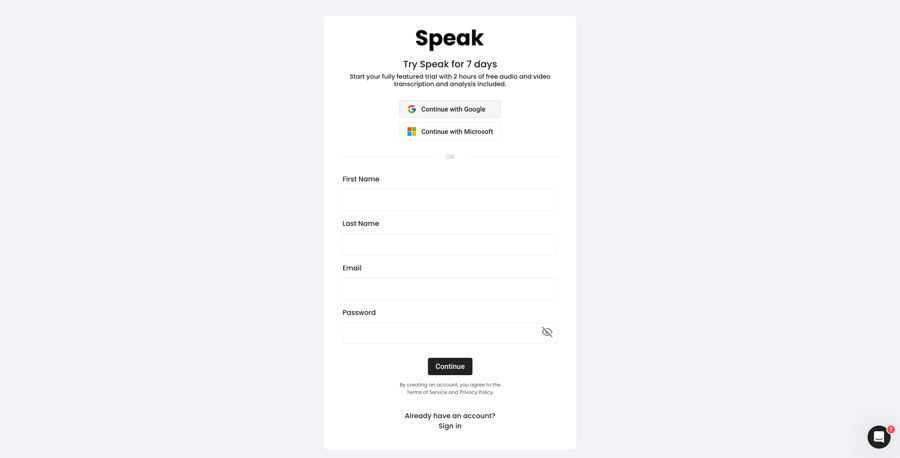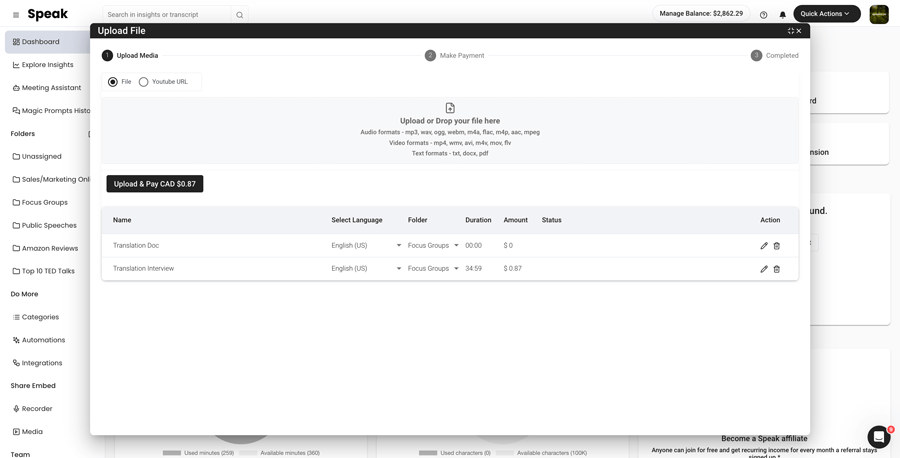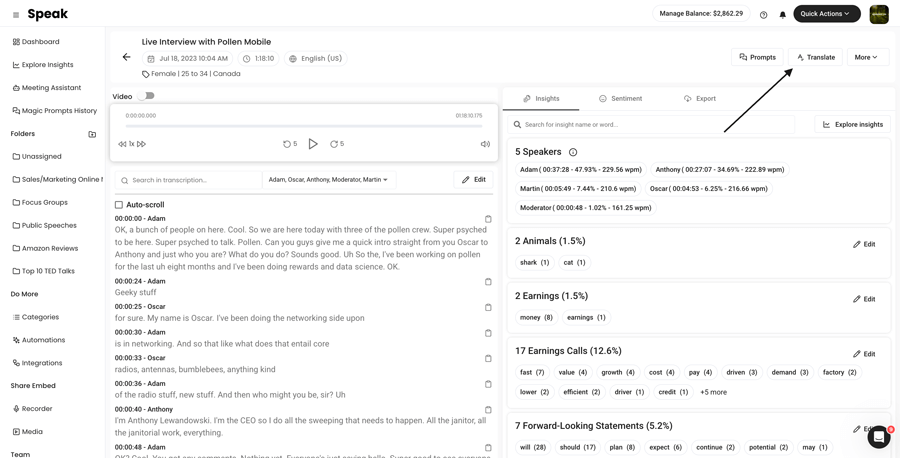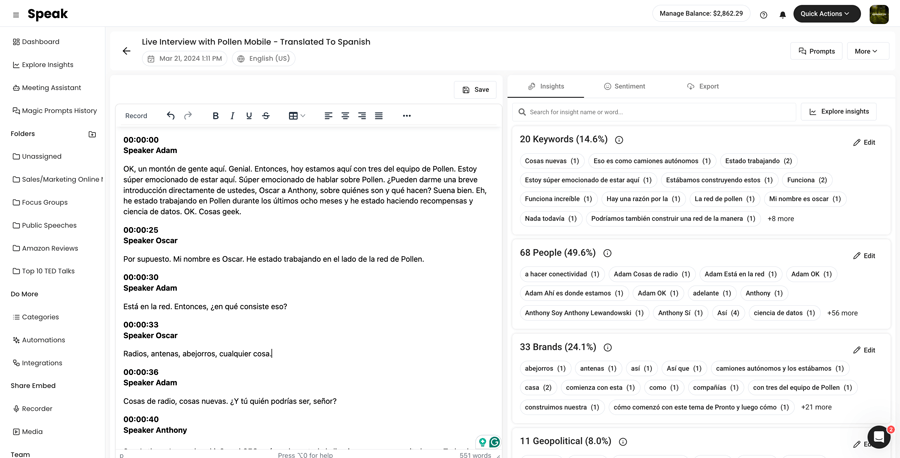How To Translate German to French (Canada)
Translating German to French (Canada) is super simple!

Step 1: Register for Speak
Register for Speak using this link.
Once you register, you can instantly begin translating your German to French (Canada) file(s).

Step 2: Upload Your German file(s)
As soon as you log in, you will be redirected to the dashboard.
Once there, you can select the Quick Action "New Upload".
In Speak, you can seamlessly upload, transcribe and translate audio, video and text files all at once!

Step 3: Translate Your German file(s) to French (Canada)
Once the file is uploaded, simply visit your file and select "Translate".
If it is an audio and video file, Speak will ask you if you want to keep the speaker names and timestamps in the translation.
Want to translate many files at once? No problem!
You can view the files you want to automatically translate from German to French (Canada) from the folder level and instantly translate as many files as you need with our artificial intelligence translation in just a few clicks.

Step 4: That's It! View, Analyze, Modify & Export Your New French (Canada) file(s)
Once the translation is done, you will be alerted and you will see a new document in the same folder your original file is in.
The file will be named the same but with a dash indicating that it is the translated version.
Need support with your German translation?
We are always here and happy to help at Speak!
Just send us a message on live chat on the bottom right corner and we will ensure you are set up for success.
Interested in translating German or other languages to different languages? View our entire list of supported translation languages here.
Automatic, accurate, instant AI translation from German to French (Canada) is here for you.
Register for Speak using this link and begin translating German to French (Canada) today.
Unlock the Power of AI in Translating German to French (Canada)
In today's globalized world, the ability to communicate across languages is more valuable than ever. Specifically, for businesses and researchers, bridging the gap between German and French (Canada) can open up new opportunities and insights. With the advent of advanced AI translation technologies, like those developed by Speak Ai, turning German audio, video, or text into French (Canada) has become a seamless, efficient, and cost-effective process.
Why Translate Between German and French (Canada)?
Both German and French (Canada) are languages rich in history, culture, and business potential. From academic research that explores the depths of European history to companies aiming to expand their market reach in Canadian provinces like Quebec, where French is predominantly spoken, the need for accurate and efficient translation is undeniable.
Benefits of AI-Powered Translation
- Time Savings: AI translation tools like Speak Ai drastically reduce the time needed to translate documents, audio recordings, and video content, allowing businesses and researchers to focus on their core activities.
- Cost Efficiency: By leveraging automatic translation, organizations can save on the costs associated with traditional translation services, making language accessibility more achievable.
- Accuracy: With continuous improvements in Natural Language Processing (NLP) and Generative AI models, AI translations have reached higher levels of accuracy, capturing nuances and context better than ever before.
- Scalability: AI translation solutions can handle large volumes of content efficiently, enabling businesses and institutions to scale their operations without language barriers.
Drive Global Engagement with Speak Ai
Speak Ai's integrated AI, leveraging NLP, Generative AI, and data visualization, makes it the optimal choice for translating between German and French (Canada). Whether it's transcribing and analyzing meetings in either language or automatically translating research papers, Speak Ai's technology ensures high-quality, context-aware translations.
Seamless Integration with Your Workflows
Our AI Meeting Assistant integrates effortlessly with platforms like Microsoft Teams, Zoom, Google Meet, and Webex, providing real-time transcription and translation. This enables multinational teams to collaborate more efficiently and inclusively, breaking down language barriers within international projects.
Customer Trust and Satisfaction
With a 4.9 rating on G2 and a user base of over 150K, our commitment to quality and user satisfaction is evident. Businesses and researchers trust Speak Ai for their translation needs, knowing they're backed by cutting-edge technology and superior customer support.
German and French (Canada): Cultural and Linguistic Dynamics
Relevance Across the Globe
German and French (Canada) hold significant sway in their respective spheres. Germany is Europe's largest economy and a hub for innovation and engineering, while French-speaking regions in Canada, particularly Quebec, represent vibrant cultural and economic communities.
Historical Ties and Modern Connections
The ties between German and French-speaking communities have been shaped over centuries. Today, through translation, these connections are strengthened, facilitating cultural exchanges and business ventures that span continents.
Fun Facts and Linguistic Nuances
Fun Facts:
- German is renowned for its compound words, while French (Canada) often incorporates anglicisms, reflecting the blend of cultures.
- Montreal, a major city in Quebec, is the second-largest primarily French-speaking city in the world, after Paris.
Differences and Similarities:
While German and French (Canada) may appear distinct, they share European roots that lead to interesting overlaps in vocabulary and expressions. However, grammar structures and pronunciation are notably different, with German having a more complex case system and French (Canada) featuring unique nasal sounds.
Speak Ai: Your Gateway to Seamless Communication
Speak Ai is at the forefront of bridging linguistic divides. Our advanced AI translation and transcription solutions open up new realms of possibility for businesses and researchers, making the translation between German and French (Canada) more accessible, accurate, and efficient than ever. Embrace the future of communication with Speak Ai, and let language be a bridge, not a barrier.
Whether you're aiming to expand your market presence, conduct cross-cultural research, or ensure inclusivity in your global teams, Speak Ai is your partner in transcending language limitations. Explore the potential of AI-powered translation and witness the transformation in your communication strategies.
Transform the way you connect across languages with Speak Ai – the ultimate tool for automatic translation and analysis.
Join the Speak Ai Community
Ready to revolutionize your language translation process? Join over 150K users who are already experiencing the benefits of Speak Ai's technology. Discover how our AI-driven solutions can enhance your business or research endeavors. Sign up today and witness the power of automatic translation in bringing German and French (Canada) closer together.
---
To answer the questions posed:
- **German** is mainly spoken in Germany, Austria, and parts of Switzerland, totaling over 130 million speakers. **French (Canada)**, specifically, is primarily spoken in Quebec and parts of New Brunswick and Ontario, contributing to Canada's French-speaking population of about 7.2 million people.
- Fun facts include that Montreal is the second-largest French-speaking city globally and German's penchant for compound words, which can lead to incredibly long terms for specific concepts or objects. On the other hand, Canadian French is known for its incorporation of anglicisms and unique expressions.
- The primary differences between German and French (Canada) lie in their grammatical structures and phonetics. German has a complex case system, while French (Canada) features unique nasal sounds not found in German. Similarities can be observed in shared European vocabulary and cultural expressions due to their intertwined histories.
Translate German To These Other Supported Languages:
- Translate German-to-Arabic (Egypt)
- Translate German-to-Arabic (Iraq)
- Translate German-to-Arabic (Israel)
- Translate German-to-Arabic (Jordan)
- Translate German-to-Arabic (Kuwait)
- Translate German-to-Arabic (Lebanon)
- Translate German-to-Arabic (Oman)
- Translate German-to-Arabic (Palestinian Authority)
- Translate German-to-Arabic (Qatar)
- Translate German-to-Arabic (Saudi Arabia)
- Translate German-to-Arabic (Syrian Arab Republic)
- Translate German-to-Arabic (United Arab Emirates)
- Translate German-to-Arabic Modern Standard (Bahrain)
- Translate German-to-Armenian
- Translate German-to-Bulgarian
- Translate German-to-Catalan
- Translate German-to-Chinese (Cantonese, Traditional)
- Translate German-to-Chinese (Simplified)
- Translate German-to-Chinese (Traditional)
- Translate German-to-Croatian
- Translate German-to-Czech
- Translate German-to-Danish
- Translate German-to-Dutch
- Translate German-to-English
- Translate German-to-English (Australia)
- Translate German-to-English (India)
- Translate German-to-English (Ireland)
- Translate German-to-English (New Zealand)
- Translate German-to-English (Scottish)
- Translate German-to-English (South African)
- Translate German-to-English (United Kingdom)
- Translate German-to-English (United States)
- Translate German-to-Estonian
- Translate German-to-Farsi
- Translate German-to-Finnish
- Translate German-to-French
- Translate German-to-French (Canada)
- Translate German-to-German
- Translate German-to-German (Swiss)
- Translate German-to-Greek
- Translate German-to-Gujarati
- Translate German-to-Hebrew
- Translate German-to-Hindi
- Translate German-to-Hungarian
- Translate German-to-Icelandic
- Translate German-to-Indonesian
- Translate German-to-Irish
- Translate German-to-Italian
- Translate German-to-Japanese
- Translate German-to-Kannada
- Translate German-to-Korean
- Translate German-to-Latvian
- Translate German-to-Lithuanian
- Translate German-to-Malay
- Translate German-to-Malayalam
- Translate German-to-Norwegian
- Translate German-to-Persian
- Translate German-to-Polish
- Translate German-to-Portuguese
- Translate German-to-Portuguese (Brazilian)
- Translate German-to-Portuguese (Portugal)
- Translate German-to-Romanian
- Translate German-to-Russian
- Translate German-to-Slovak
- Translate German-to-Slovenian
- Translate German-to-Spanish
- Translate German-to-Spanish (Mexico)
- Translate German-to-Swedish
- Translate German-to-Tamil
- Translate German-to-Telugu
- Translate German-to-Thai
- Translate German-to-Turkish
- Translate German-to-Ukrainian
- Translate German-to-Vietnamese



